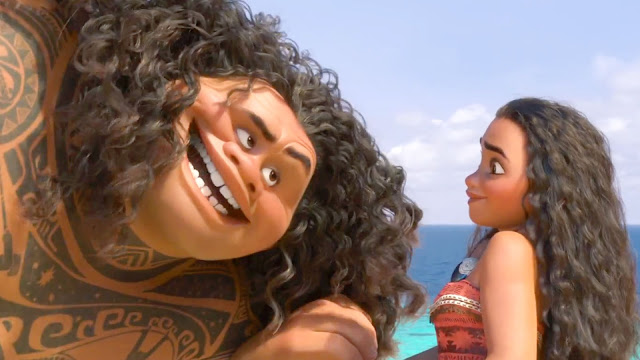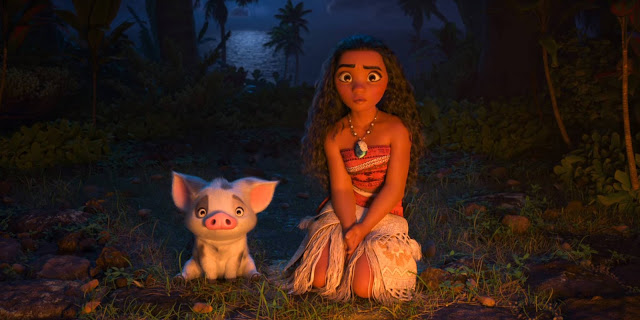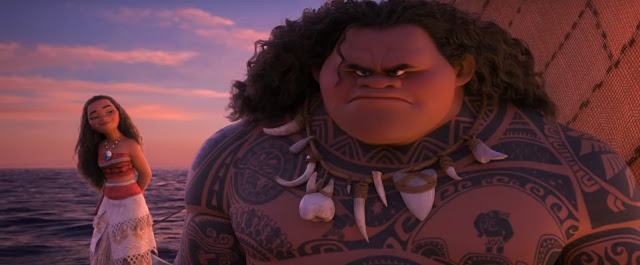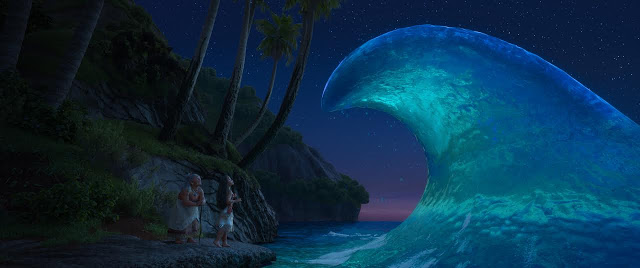Midway through Moana, the iridescent and irresistible new animated adventure from Walt Disney Studios, an observer sizes up the title character: “If you wear a dress and have an animal sidekick, you’re a princess.” The speaker is the demigod Maui, and along with his other impressive talents—shape-shifter, warrior, chest-thumper—you can add meta commentator. Disney is as much a cultural institution as a movie studio, and Maui’s blunt assessment of Moana’s effective nobility—she feebly objects that she’s the daughter of a chief, not a king—reflects the company’s evolving self-awareness. Now in its ninth decade, the Mouse House has churned out countless tales of feminine royalty, films that are, depending on whom you ask, either exciting and empowering or formulaic and stereotypic. Moana is, in one way or another, all of these things. Yes, it’s yet another journey of self-discovery, featuring yet another plucky heroine of high birth, one who follows in the well-trodden footsteps of Aurora, Ariel, and Anna. And so what? There are far worse blueprints to hew to, much less to subtly reengineer and reinvigorate. Winking commentary aside, Moana doesn’t reinvent the (spinning) wheel, but it does capably tweak and troubleshoot the Disney formula, resulting in a thoroughly enjoyable movie that’s by turns playful and poignant.
This incremental progress begins, of course, with the film’s setting. Long criticized for its emphatic whiteness, Disney has endeavored in recent years to diversify its universe, and Moana continues that trend, taking place in Polynesia. Whether this represents legitimate growth or mere tokenism is not for me to say; in any event, I am less interested in the political dimensions of this movie than its cinematic ones. And as a piece of storytelling, the opening act of Moana is pleasant but unremarkable. Moana (voiced by newcomer Auli’i Cravalho) is the restless daughter of a local chief, dutifully obeying her tribe’s customs but constantly feeling a silent tug from the Pacific. You know the drill: She feels unfulfilled with her routine, and she chafes at her father’s insistence that she never venture beyond their island’s barrier reef. In other words, she’s a lot like Ariel. Or Merida. Or Rapunzel. To paraphrase another famous Disney character who will be returning to theaters early next year: There must be more than this provincial fishing life!
Thankfully, there is. With her village on the brink of famine, Moana sneaks off in a boat, accompanied by a loyal, brainless, and not especially funny chicken (next time, writers, stick with the pig). Her mission is to locate Maui, a fallen demigod who, according to folklore, once stole a sacred stone from the island called the Heart of Te Fiti. Only by convincing Maui to return the stone can Moana rescue her people from blight and starvation.
Up to this point, we’re still in the status quo, with only slight variations on the typical Disney-princess escapade. But once Moana finds Maui, Moana finds itself. Voiced with zeal by Dwayne Johnson, Maui is nearly as incredible as he says he is; if that sounds like a backhanded compliment, bear in mind that he considers himself God’s literal gift to mankind. A hulking figure with rippling muscles and ornate tattoos that wander across his skin, Maui is both completely glorious and gloriously vain. In the movie’s best song, “You’re Welcome,” he faux-graciously accepts imaginary praise for his various accomplishments, each of which he’s all too eager to tell you about. “What can I say except, ‘You’re welcome,’ for the tides, the sun, the sky,” he enthuses to a mystified Moana, his tattoos jitterbugging the entire time. It’s the kind of ear-worming, toe-tapping Disney number that makes you want to jump to your feet and applaud, even if you also sort of want to punch its singer in the face.
Maui’s braggadocio may seem a curious fit with Moana’s earnestness, but they prove to bring out the best in each other. And in terms of narrative, Moana— which is being preceded in theaters by a delightful short called Inner Workings—is perhaps most notable for its frugality. The movie is essentially a modest two-hander, a buddy comedy in which Moana and Maui bicker, bluster, and bond. To be sure, there are a handful of diverting action scenes—an attack by a band of tiny, feral pirates pays homage to Mad Max: Fury Road, while an episode involving a gem-craving crab (Jemaine Clement) provides a robust interlude of escapist derring-do. Mostly, though, Moana is a genuinely heartfelt film about two people learning to embrace one another and accept themselves; in case the point weren’t clear enough, the climactic song is titled “Know Who You Are”.
Speaking of songs, Moana’s ditties—which were composed by Opetaia Foa’i, Mark Mancina, and a little-known fellow named Lin-Manuel Miranda—don’t quite match the transcendent, instant-classic heights of Frozen, but they’re strong, with well-crafted melodies and peppy, sing-along choruses. And while the animation isn’t as magnificent as the oceanic triumph of Finding Dory, it’s nevertheless exquisite in its detail. (The movie was directed by Disney mainstays Ron Clements and John Musker, who helped usher in the studio’s Renaissance with The Little Mermaid and Aladdin.) That’s especially true of the foamy waves and Moana’s curly locks—when she whips her hair around after getting sprayed by the sea, you can see each individual droplet of moisture. (The 3-D, meanwhile, is satisfactory but hardly worth the surcharge.)
For all its charms, Moana falls short of greatness. It has neither the intricate plotting of Zootopia nor the elegiac beauty of Kubo and the Two Strings, while its central villain—a lurching, fiery demon called Te Kā—is bland, lacking the personality or menace of big bads past. (This is partly by design, but while Moana concludes with a gratifyingly strange and lovely anticlimax, it could have used a bit more red-blooded excitement.) Yet the film’s shortcomings are relative. Moana may not reach Disney’s first tier, but it’s also a reminder of what the studio can do. Here is a vibrant, tender, altogether satisfying movie, one that features good music, gorgeous visuals, and, most importantly, richly drawn central characters. When faced with that, what can a critic say except, thank you.
Jeremy Beck is the editor-in-chief of MovieManifesto. He watches more movies and television than he probably should.




